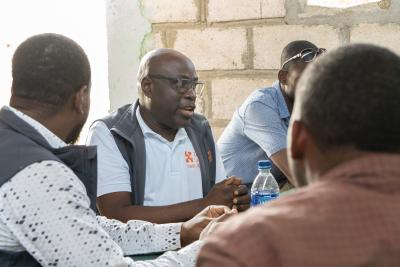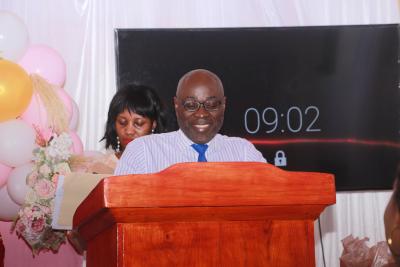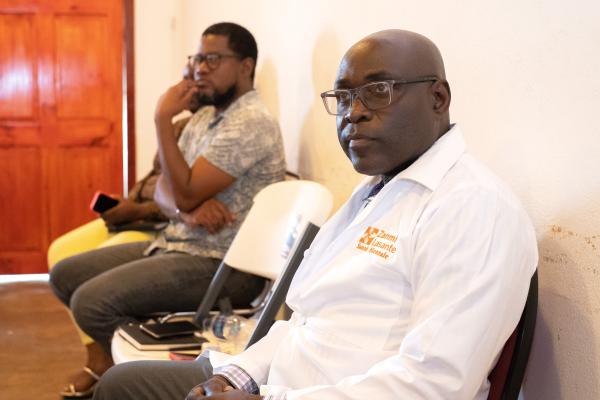Family medicine, often considered the cornerstone of effective healthcare systems, finds a passionate and committed advocate in Haiti: Dr. Dorestant. A family physician, trainer in the Family Medicine Residency Program (PRMF) at Hôpital Saint-Nicolas in Saint-Marc, and coordinator of the mental health program at Zanmi Lasante, he embodies a deep commitment to an integrated, humane approach to care. His career has been marked by inspiring encounters, challenges overcome with resilience, and a clear vision for the future of healthcare in Haiti. Through this portrait, he shares the foundations of his vocation, his strongest convictions and the lessons he hopes to pass on to a new generation of doctors called upon to transform the country’s healthcare landscape.
A journey guided by exceptional mentors
Dr. Dorestant attributes an essential part of his success to inspiring figures who shaped his training. A graduate of Quisqueya University, he was profoundly influenced by trainers such as Dr. Genna and Dr. Jean-Baptiste, as well as fellow residents Dr. Jean Charles and trainer Dr. Sainvillien. These encounters awakened in him a vocation for family medicine, a specialty he was unaware of during his early years of study.
His testimony highlights the importance of role models in the construction of a professional identity. As Dr. Dorestant states with conviction, “If I had it to do over again, I would choose family medicine again without hesitation.” A statement that reflects his deep passion and certainty that this discipline is essential to meeting the multiple and complex needs of patients, particularly in the Haitian context.
For Dr. Dorestant, family medicine is much more than a medical specialty: it’s a philosophy of human-centered care. His biopsychosocial approach enables him to see “the patient before his illness”. This perspective is particularly crucial in Haiti, where structural constraints , such as limited access to paraclinical examinations, the presence of counterfeit drugs and scarce resources, impose constant vigilance and adaptability on caregivers.

He advocates a healthcare system refocused on family medicine, drawing inspiration from the Cuban and Canadian models. Among his recommendations:
- Allocate an adequate budget to healthcare, with a share reserved for primary care;
- Train family doctors on a massive scale;
- Create the socio-economic conditions necessary for sustainable practice in rural areas.
“Our healthcare system will only recover by giving family medicine its central role,” he asserts with conviction. This plea is part of a vision of the future in which every patient, wherever they live, could benefit from local, continuous, high-quality support.
Challenges and resilience in everyday life
The obstacles encountered by Dr. Dorestant are immense. Between counterfeit drugs and an often-failing system, every day is a struggle. Yet it is at the very heart of these difficulties that the strength of family medicine in Haiti is revealed.
He emotionally evokes poignant situations, such as that of a patient who returned in a state of hypoglycemia after taking a fake drug - illustrating the urgency to act. Despite these demoralizing realities, his empathy and determination remain intact: “Despite everything, we carry on.” This resilience, he believes, lies at the heart of the Haitian family doctor’s identity.

Deserved recognition and a message of hope
On World Family Medicine Day, Dr. Dorestant was recognized as a true role model by the residents. A recognition he welcomes with humility and sees as a call to redouble his efforts: “It’s a permanent invitation to honor this trust by giving my best every day.”
His message to young doctors is clear: family medicine is a vocation, not a default choice. It requires total commitment and a passion for holistic patient care, from birth to the end of life.
Finally, he convincingly reiterates the unique role of the family doctor: “We are the only ones who can legitimately say, ‘I am your doctor.’
This relationship of trust, rooted in continuity, is the key to a strong healthcare system, in his view.
Dr. Dorestant embodies the very essence of family medicine: dedication, resilience and vision. His journey shows that, despite the challenges, it is possible to build a medical practice that combines technical expertise with profound humanity. In Haiti, where needs are crying out, his plea for a robust and recognized family medicine brings a glimmer of hope.
“The day the state understands this, our population will be healthier, he lucidly asserts. May his words inspire not only his colleagues and residents-in-training, but also decision-makers, to act for a fairer, healthier future.
Dr. Dorestant’s story is a powerful reminder: family medicine is not just a specialty, it is the beating heart of a healthcare system. And in Haiti, that heart continues to beat thanks to professionals like him, who refuse to give up in the face of adversity.
